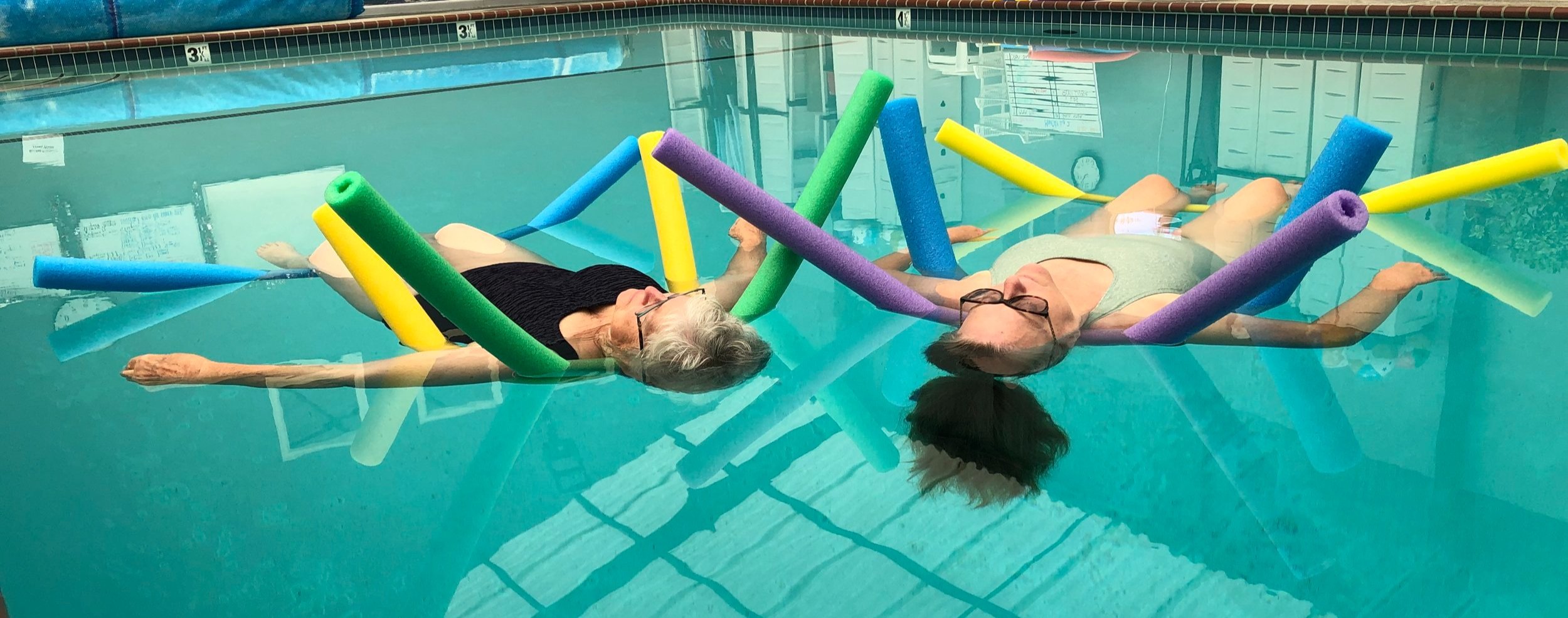Warm Water Does A Body Good: Mental Health Benefits of Immersion
You may be well-aware of the physical benefits of aquatic exercise, but have you ever considered the mental health benefits of your water workouts?
Immersing yourself in warm water can result in many positive outcomes: less stress and anxiety, improved mood, and an overall sense of well-being and happiness, to name a few. Here are some reasons why the pool contributes to your mental health:
Blue Mind Theory. Blue Mind refers to the meditative state that some people fall into when in, under, on, or near water. Since those of us in Santa Barbara have chosen to live just steps from the ocean, it’s easy to see how this theory could be true. Biologist Dr. Wallace J. Nichols studied Blue Mind & wrote about how proximity to water can improve performance, increase calmness, and decrease anxiety in his 2014 book. You can also watch his TEDx talk and his short film, Blue Mind: Water Is Medicine, both available on YouTube.
Causes release of endorphins & dopamine. Endorphins are hormones (neurotransmitters) that are created in your brain and released when your body feels pain or stress as well as during pleasurable activities. One of the best ways to release endorphins is through exercise, on land or in the water. Endorphins are natural pain relievers: they attach to your brain’s reward centers (opiate receptors) and block the nerve cells that receive pain signals. Endorphins also boost the release of dopamine, a “feel-good” hormone that’s associated with your brain’s reward system and associated with pleasurable sensations.
Fun fact: Laughter can also improve mood by boosting dopamine and endorphin levels.
Not-so-fun fact: Opiate medications trigger the same receptors in the brain as endorphins, producing a much stronger reaction and often inhibiting natural endorphin release. Opiates also flood the brain with dopamine, causing the brain to limit how much dopamine it produces and/or reducing receptors to dopamine.
Promotes a sense of confidence, comfort, and safety. In the pool, you may be able to move in ways you can’t on land due to pain, weakness, or other mobility issues. The buoyancy of water allows you to exercise and perform balance training with less risk of physical injury, allowing you to feel more confident with your workouts. Your brain then identifies the water as being a comfortable & “safe” place for you, desensitizing chronic pain pathways and promoting a sense of calmness.
Opportunities for friendships & socialization. Meeting others with similar interests (like a love of the water!) gives you a chance to build a new, supportive circle of friends. Working out with a partner or classmates often passes the time quicker and makes you more likely to try new things, while also holding you accountable to your fitness regimen. (Your friends WILL notice if you don’t show up for class!)
Regulates your sympathetic & parasympathetic nervous systems. This is one of the physiological reasons why a warm pool feels so good… It’s also why a relaxing bath or soak in a hot tub is so appealing after a particularly stressful day. Researchers have concluded that immersion in warm water helps to balance your sympathetic & parasympathetic nervous systems, allowing you to feel more relaxed & less anxious, and possibly relieving pain, too.
The sympathetic system is your “flight or fight” system, and it’s associated with stress responses.
The parasympathetic system is your “rest and digest” system, linked to relaxation.
To maximize these mental health benefits in the pool, we have a few tips for you:
Don’t skip your stretch (or savasana!)! Allot at least five minutes at the end of your workouts to stretch, relax, and/or meditate. Short on time? Consider taking 5 minutes to yourself before your class or session begins to prioritize this part of your workout.
New to meditation? Try a simple gratitude practice (identifying things in your life that you’re particularly grateful for), a body scan (paying extra attention to areas of your body that are particularly tight, tense, or stiff and also noticing areas of that feel good!), or a mantra (repeating a sound, word, or phrase that’s meaningful to you, thereby eliminating outside chatter in your head).
Be mindful of your breathing. Long, deep exhales can help to further activate your parasympathetic nervous system. Read more about parasympathetic breathing here. Diaphragmatic breathing, rather than chest breathing, can assist with the relaxation response, too. Consider these techniques when stretching or performing mobility exercises.
Schedule self-love. Aqua Yoga focuses on mindfulness, breathwork, and gentle stretching, a great complement to a more intense fitness regimen or stressful lifestyle! Private (1:1) & group classes are available at Anderson Aquatics. Floating bodywork sessions are another way to reward yourself with some extra love & attention. Read more here.
Now you can see why your warm water workouts can be so addicting! Do you have any questions? We would love to hear from you!
Content provided on this website is for informational and educational purposes only; it does not constitute providing medical advice or professional services. Always seek the advice of your physician regarding your health conditions and prior to initiating an exercise program.

